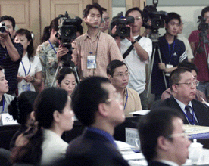 The long-awaited public hearing on the price-adjustment scheme for Chinese airlines can serve as a useful litmus test of the aviation administration's commitment to market rules.
The long-awaited public hearing on the price-adjustment scheme for Chinese airlines can serve as a useful litmus test of the aviation administration's commitment to market rules.
However, the price floor that the authorities have already established in the draft plan indicates that faith in market competition has yet to prevail among policy-makers.
The price hearing has been rescheduled for today due to the outbreak of severe acute respiratory syndrome (SARS) in April. The ramifications of the potentially fatal epidemic on the aviation sector understandably aroused much public sympathy in the past two months.
Fortunately, the country's initial triumph over the SARS outbreak in late June has allowed representatives to the hearing to concentrate again on the essentials of the price-reform scheme.
In their draft plan, the aviation authorities have squarely pointed out three existing faults in the sector -- an inflexible pricing system that does not meet market demand, vicious price wars among Chinese airlines and irregular agency business.
These criticisms are all quite pertinent to the situation of the Chinese aviation market.
However, the solution produced by those who wrote the draft is, sadly, so misguided that the progress of market-oriented aviation reform could be delayed, if not destroyed.
According to the draft plan, a maximum discount of 40 percent and a maximum price increase of 25 percent will be imposed on the basic price of 0.75 yuan (9 US cents) per person per kilometer.
By limiting the airline companies' ability to raise prices at will, the authorities are commendably defending the interests of consumers.
Nevertheless, the establishment of a minimum price level means the thrust of the reform scheme has become a casualty of some decision-makers' strong scepticism towards the market's role in optimizing the allocation of resources.
The underlying reason cited by the authorities for setting a price floor was the immaturity of the Chinese aviation market.
They fleshed out their argument with seemingly irresistible facts such as that, in the absence of an anti-monopoly law, no effective measures can be adopted to curb price cuts regardless of cost. Since most aviation companies are State-owned, falling prices could result in the loss of State assets, they said. Furthermore, the price of a plane ticket is still subject to government guidance and requires a floating price range, they added.
Admittedly, these concerns are very much relevant to the revitalization of the aviation sector. But they do not cover everything that is at stake and thus should not blind policy-makers to what is needed for the sector's long-term development.
In fact, many Chinese airlines have already offered discounts of more than 40 percent, so the new price floor does not make much sense in increasing price flexibility.
A more acceptable price level in line with the growth of the public's income would be not only in the interests of the majority of the population but also crucial to the expansion of the market, which is a key factor in addressing the overcapacity of Chinese airlines. Lower transportation costs will also help the economy raise the value of State-owned assets in different sectors.
However, a minimum price will not put a premium on efficiency-oriented competition and reorganization. Instead, it will sow more paranoia among those airlines that continue to rely on hidden favors from the authorities.
Moreover, the State Development and Reform Commission has published a provisional rule that bans the price monopolies of both predatory pricing and below-cost price wars.
Therefore, it is now incumbent on the aviation authorities to take the lead in showing faith in the new regulation by stopping their own interference in the market.
(China Daily July 15, 2003)
|

